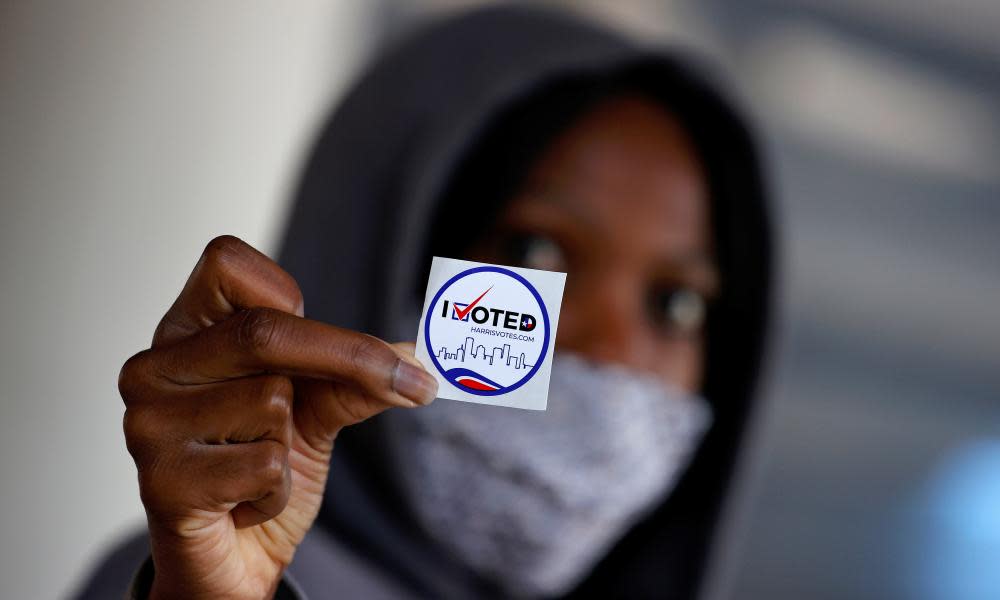The Texas county that explains why Republicans are terrified

- Oops!Something went wrong.Please try again later.
Happy Thursday,
I’m writing from my hotel room in scorching-hot Sugar Land, Texas, a city that’s just south-west of Houston, where I’m doing some reporting for our ongoing series this summer about gerrymandering. Stay tuned for more details on that story, and you can read the first, second and third pieces in our series in the meantime.
As you may have heard recently, Texas has become a kind of epicenter of conservative political extremism, as Republicans who control the legislature have pushed through the most restrictive abortion law in the United States, significantly loosened gun laws and passed harsh new voting restrictions. To understand why that’s happening, you have to understand what’s happening in Sugar Land, and in Fort Bend county.
Since 2010, the population in Fort Bend county has just exploded. Last year, the census counted 822,779 people living here, a staggering 40% increase from a decade ago. It’s part of the metro and suburban growth that helped Texas’s population grow by 16% over the last decade, making it one of the fastest-growing places in the US.
The county is also now extremely diverse; it is nearly 32% white, 25% Hispanic or Latino, 21% Asian and 21.3% Black.
“Fort Bend county is probably the most ethnically diverse county in the United States,” Stephen L Klineberg, the founding director of Kinder Institute for Urban Research, who closely studies the demographics of the Houston area, told me. “And so it’s a perfect model for what the American future [will look like].”
Even though Sugar Land is just a short drive from Houston, it is a bona fide city in its own right. There’s a walkable town square with shops and an array of restaurants. In the center is city hall, flanked by a huge plaza and fountains where kids were chasing each other around last night.
“You walk into a new restaurant, you walk into a bar, you walk into a bookstore, you see the diversity in Fort Bend county,” said Mustafa Tameez, a Democratic political strategist. “What used to be just a suburb is now becoming very much like an urban community – highly educated, diverse voters living in close proximity to each other.”
The population isn’t the only thing that’s changing – the politics are too. In 2012, Mitt Romney handily won the county over Barack Obama by about 10 points. But in 2016, Hillary Clinton defeated Donald Trump by six points. In 2018, Beto O’Rourke won the county in his US Senate campaign against Ted Cruz. Biden carried the county in 2020.
In 2018, Democrats won all the top county positions on the ballot, including ousting the county judge, the highest elected position in the county, a Republican incumbent who held the post for a decade.
The winning candidate was KP George, an Indian-American immigrant and Democrat, who was trounced when he ran for county treasurer in 2010 and then became a commissioner on the school board in 2014. He decided to run for judge when he saw how many people supported Hillary Clinton in 2016. “That was an eye opener,” he told me over the phone a few weeks ago.
These are the kinds of elections that are scaring Republicans in Texas, who still maintain complete control over state government. And it helps explain why they are imposing such extreme policies in the state legislature.
“There’s been explosive growth in the suburbs of Texas and that is driving through the change in politics that is creating this kind of last hurrah kind of thing for people like [Texas Lieutenant Governor] Dan Patrick, and Governor Abbott and others that are trying to get as many conservative things as they can possibly get done. Because it’s not a reflection of the population and where the population is headed,” Tameez said.
Klineberg, the demographer, added that there was no way for Republicans to stop the kind of demographic change happening in Fort Bend county. “The Republicans see the handwriting on the wall,” he said.
I’m also thinking about …
The Texas governor, Greg Abbott, signed the sweeping new legislation restricting voting access into law on Tuesday. The new law faces several challenges already in state and federal court.
Several places are seeing a flood of people signing up for lower-level GOP positions that could play a big role in how elections are administered, according to a remarkable story from ProPublica. “I’ve never seen anything like this, people are coming out of the woodwork,” one Florida GOP chairman told the outlet.
Have any questions about elections and voting?
Send them to me! Starting this week, you can send me your burning questions about voting rights in America and I’ll do my best to answer them in next week’s newsletter. You can send your questions to sam.levine@theguardian.com or DM me on Twitter @srl

